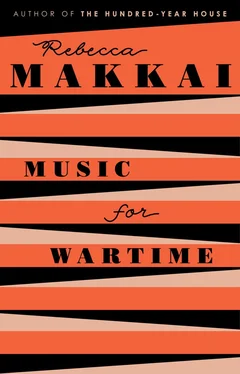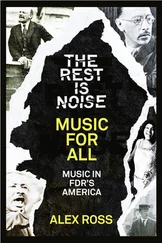The money arrives less often, and even old friends who used to write monthly now send only rare, apologetic notes, a few small bills. Things are more difficult now, their letters say. No one understood when he first ran away, but now it is clear: After they finished with the artists, the journalists, the fighters, they came for the professors. How wise he was, to leave when he did. Some letters return unopened, with a black stamp.
Life is harder here, too. Half the shops are closed. His lover has left him. The little café is filled with soldiers. The beggar with the violin has disappeared, and the chef fears him dead.
One afternoon, he enters the post office two minutes before closing. The lobby is empty but for the postman and his broom.
The mailbox is empty as well, and he turns to leave but hears the voice of the postman behind him. You are the good Professor T——, no? I have something for you in the back.
Yes, he says, I am the professor. And it feels as if this is true, and he will have no guilt over the professor’s signature when the box is brought out. He is even wearing the professor’s shirt, as loose again over his hungry ribs as it was the day he slipped it on in the alley.
From behind the counter, the postman brings no box, but a woman in a long gray dress, a white handkerchief in her fingers.
She moves toward him, looks at his hands and his shoes and his face. Forgive me for coming, she says, and the postman pulls the cover down over his window and vanishes. She says, No one would tell me anything, only that my husband had his health. And then a student gave me the number of the box and the name of the city.
He begins to say, You are the widow. But why would he say this? What proof is there that the professor is dead? Only that it must be, that it follows logically.
She says, I don’t understand what has happened.
He begins to say, I am the good professor’s assistant, madam — but then what next? She will ask questions he has no way to answer.
I don’t understand, she says again.
All he can say is, This is his shirt. He holds out an arm so she can see the gaping sleeve.
She says, What have you done with him? She has a calm voice and wet brown eyes. He feels he has seen her before, in the streets of the old city. Perhaps he served her a meal, a bottle of wine. Perhaps, in another lifetime, she was the center of his universe.
This is his beard, he says.
She begins to cry into the handkerchief. She says, Then he is dead. He sees now from the quiet of her voice that she must have known this long ago. She has come here only to confirm.
He feels the floor of the post office move beneath him, and he tries to turn his eyes from her, to ground his gaze in something solid: postbox, ceiling tile, door. He finds he cannot look away. She is a force of gravity in her long gray dress.
No, he says. No, no, no, no, no, I am right here.
Of course he does not believe it, but he knows that if he had time, he could prove it. And he must, because he is the only piece of the professor left alive. The woman does not see how she is murdering her husband, right here in the post office lobby. He whispers to her: Let me go home with you. I’ll be a father to your son, and I’ll warm your bed, and I’ll keep you safe.
He wraps his hands around her small, cold wrists, but she pulls loose. She might be the most beautiful woman he has ever seen.
As if from miles away, he hears her call to the postmaster to send for the police.
His head is light, and he thinks he might float away from the post office forever. It is an act of will not to fly off, but to hold tight to the earth and wait. If the police aren’t too busy to come, he feels confident he can prove to them that he is the professor. He has the papers, after all — and in the havoc of war, what else will they have time to look for?
She is backing away from him on steady feet, and he feels it like a peeling off of skin.
If not the police, perhaps he’ll convince a city judge. The witnesses who would denounce him are mostly gone or killed, and the others would fear to come before the law.
If the city judge will not listen, he can prove it to the high court. One day he might convince the professor’s own child. He feels certain that somewhere down the line, someone will believe him.
PETER TORRELLI, FALLING APART
W hen Carlos asked why I would risk my whole career for Peter Torrelli, I told him he had to understand that in those last three years of high school, Peter and I were the only two gay boys in Chicago. Because I really believed it, back then, and twenty-five years of experience proving otherwise was nothing in the face of that original muscle memory: me and Peter side by side on the hard pew during chapel, not listening, washed blind by the sun from the high windows, breathing in sync. It didn’t matter that we weren’t close anymore, I told Carlos. The point was, he’d been my first love. I’d never actually loved him, but still, listen, believe me, there’s another kind of first love.
It was during one of those long lectures or concerts or assemblies that Peter and I had discovered our common neurosis: the fear of magically switching bodies with the speaker or singer or priest and then having to improvise an exit. I would slide toward Peter on the pew, open a hymnal, and above “A Mighty Fortress Is Our God” scribble in pencil: “Tuba player?” Peter would look up to the stage to watch the fat sophomore from Winnetka puff his cheeks like a blowfish and write back: “Stop playing — no one misses a tuba.” “1st Violin?” I wrote. “Feign a swoon,” he’d write back. And then he’d mouth it to me, relishing the “oooo” of “swoon.” We joked about this fear, but really I think it bothered us both — this idea that we might suddenly be thrust in front of our peers and examined. It doesn’t take a psychotherapist to figure out why. Peter later claimed the whole reason he became an actor was that the only way he could enjoy a show was from the inside.
Everyone else knew it was his looks. I hadn’t understood until we were sixteen what it meant to turn heads. I’d considered it a figurative expression. But when we stood in line for pizza slices, or walked down Dearborn toward the bus, he was a human magnet. He was the North Pole. The girls at school would feel his sweater and tug his necktie. He said he had a girlfriend back east, that she was Miss Teenage Delaware, and everyone believed it. How could he not be onstage with that dark, sad face, that ocean of black hair, those sarcastic eyes? By the time we graduated, he’d done two seasons of professional summer stock. I was the varsity soccer goalie, and he was a movie star walking among us. When we sat together in chapel we looked like the kings of the school, and nobody knew any different.

And then the next day we were thirty-six years old, and Peter fell to pieces. During a matinee of Richard III , right in the middle, my friend abruptly and forever lost the ability to act. He said later it was something about the phrase “jolly thriving wooer,” the strangeness of those words as they left his mouth, the pause a second too long before Ratcliffe entered. Since Peter told me all this, I’ve read the page ten times in my Signet Classic — which is how I know that Peter’s next line, as Richard, was “Good or bad news, that thou com’st in so bluntly?” It was a line he’d have made lewd jokes about backstage. “And I said it,” he told me. “But it came out in this voice , like all the costumes had fallen away, like I was some kid in eighth-grade English and I had to read my poem out loud. It was just me , and there was no character, no play, just these words I had to say. You know our whole thing about leapfrogging into someone else’s body? It was like that, but like I suddenly leapfrogged into myself.” He said he could see each face in the audience, every one of them at once, smell what they ate for lunch. He could feel every pore of his own skin, and the ridiculous hump strapped to his back. Backstage, they knew something was wrong even before he started to shake. By the end of the next scene, the understudy was dressing.
Читать дальше













